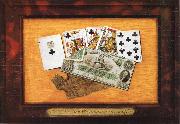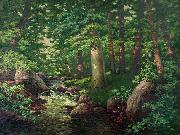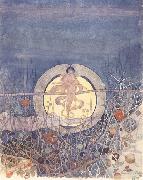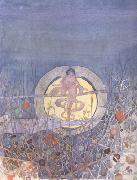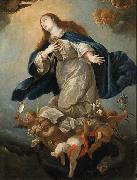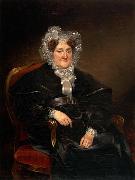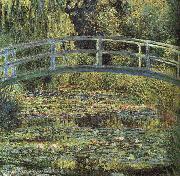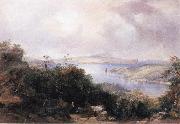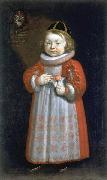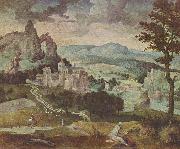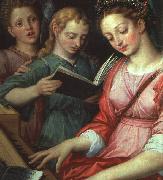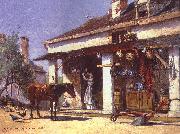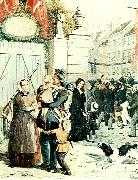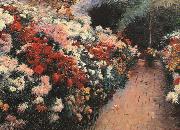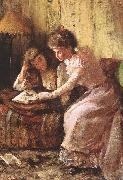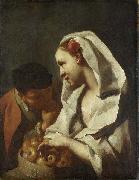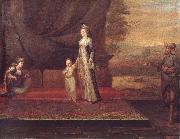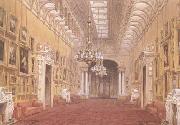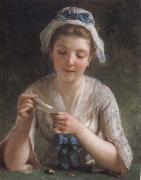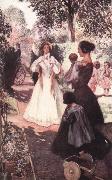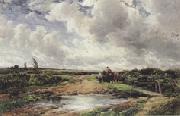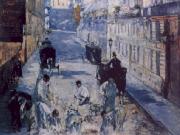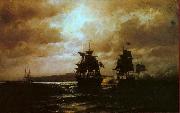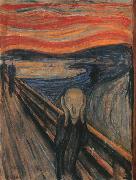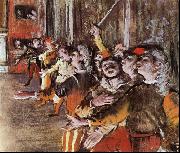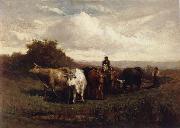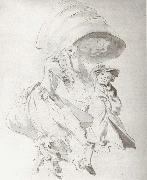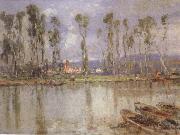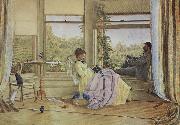|
|
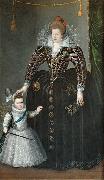 |
Charles Martin
|
|
Charles Martin (1884-1934) was a French artist and illustrator. |
|
|
|
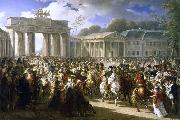 |
Charles Meynier
|
|
Charles Meynier (1763, Paris - 1832, Paris) was a French painter. A student of François-Andre Vincent, Meynier won the second prize in the 1789 prix de Rome competition. He made designs for the bas-reliefs and statues on the Arc de Triomphe du Carrousel and was, from 1816 onward, a member of the Academie des Beaux-Arts
|
|
|
|
|
|
|
|
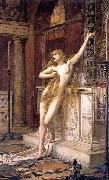 |
Charles William Mitchell
|
|
(1854 - 1903) was an English Pre-Raphaelite painter from Newcastle. A contemporary of John William Waterhouse, his work is similar in many ways. His one famous piece was Hypatia, shown in 1885 and likely inspired by the Charles Kingsley serialized novel Hypatia or New Foes with an Old Face. This painting is currently in the Laing Art Gallery. |
|
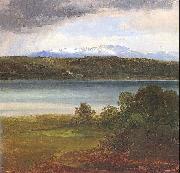 |
Christian Ernst Bernhard Morgenstern
|
|
(29 September 1805 - 12 Februar 1867) was a German landscape painter. Morgenstern is regarded as one of the pioneers in Germany of early Realism in painting. He gained this reputation in Hamburg 1826-1829 together with his contemporary Adolph Friedrich Vollmer while both were still studying; from 1830 onwards, Morgenstern, together with Friedrich Wasmann, Johan Christian Dahl and Adolph Menzel, introduced Munich to Realist painting.
Morgenstern was born in Hamburg as one of six children to a painter of miniatures, Johann Heinrich Morgenstern (1769-1813). After the early death of his father he was placed as an apprentice in the graphic workshop of the brothers Suhr. Cornelius Suhr took the young Morgenstern as his servant on a two-year journey through Germany to publicise the panorama prints which the brothers Suhr produced. 1822 followed another long journey to St. Petersburg, where they stayed for a year and to Moscow. On their return to Hamburg Morgenstern succeeded in leaving Suhr (Vollmer took his place). He became a student of the Hamburg painter Siegfried Bendixen with whom he stayed from 1824 to 1827, then continued his studies at the Royal Danish Academy of Fine Arts in Copenhagen (1827-1828) and undertook study journeys through Sweden and Norway. Bendixen introduced him to the wealthy aristocrat and supporter of the arts, Carl Friedrich von Rumohr, patron to many young Hamburg artists, on whose estate in Holstein he spent several summers. In 1830 Morgenstern went to Munich on Ruhmor's advice. He settled there permanently while undertaking extensive yearly study trips: for the first years through Bavaria, then in the summer of 1836 and in the following summers to the Alsace as guest of a patron of the arts. The winter 1839/40 he returned to Hamburg to stay with his mother. In 1841 he visited Venice and Trieste together with the landscape painter Eduard Schleich and in 1843, and again in 1846 the central Alps. In the summer of 1850 he stayed on Heligoland. |
|
 |
Christian Mali
|
|
painted Magd mit Kuhen an der Tranke am See an einem sonnigen Fruhlingsmorgen, Munchen in 1880 |
|
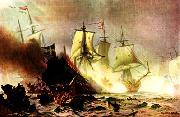 |
Christian Molsted
|
|
(1862-1930) was a Danish artist who specialized in marine painting. He is best known for his painting of the frigate Niels Juel during the Battle of Helgoland on 9 May 1864.
Born in Dragør on 15 October 1862, Mølsted was the son of fisherman Andreas Adolf Nikolaj Mølsted and Ane Hans-Nielsdatter. With financial support from a relative, he completed his school education in Copenhagen at Det tekniske Selskab where he graduated in 1879. After sailing to Madeira that summer on the frigate Jylland, he entered the Danish Academy in October 1880 with mentors such as Frederik Vermehren, Jorgen Roed, Julius Exner and Carl Bloch. During his studies, Mølsted travelled to Paris and London where he was able to observe contemporary art. He graduated from the Academy with a painting diploma in January 1885. He first exhibited in December 1884 and thereafter at the spring exhibitions. In 1889, he was awarded the Neuhausen Prize for his Skibe i Havnen ved Larsens Plads. His subjects are for the most part taken from the coasts around Copenhagen or in Jutland. Among the artist favorite subjects were the heroic battles of captains Tordenskjold and Willemoes. Historical details, as well as detailed information about the ships, was provided for the paintings by Otto Dorge, a Dragør local expert. Later in life, he also made genre paintings. Mølsted's works were widely appreciated for his perfectionist approach, his attention to historical detail and his ability to bring things to life. He died on 10 May 1930 in Dragør. |
|
|
|
|
|
|
|
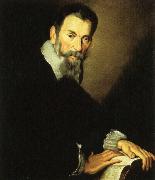 |
claudio monteverdi
|
|
Period: Baroque (1600-1749)
Country: Italy
Born: May 15, 1567 in Cremona, Italy
Died: November 29, 1643 in Venice, Italy
Genres: Ballet, Choral Music, Miscellaneous Music, Opera, Vocal Music
|
|
|
|
|
|
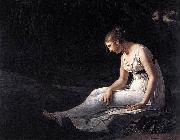 |
Constance Marie Charpentier
|
|
(born 1767 Paris, France - August 3, 1849 France) was a French painter. She specialized in sentimental genre scenes and portraits, mainly children and women. She was also known as Constance Marie Bondelu.
She studied under Jacques-Louis David and Francois Gerard. In 1788 she received a 'Prix d'Encouragement.' From 1795 to 1819 she exhibited at the Salon where she received a gold medal. |
|
 |
Constance Mayer
|
|
Marie-Françoise-Constance Mayer-Lamartiniere
French Neoclassical Painter, 1775-1821 |
|
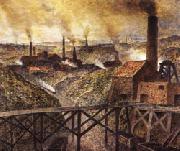 |
Constantin Meunier
|
|
(12 April 1831 - 4 April 1905), Belgian painter and sculptor, was born in Etterbeek, Brussels.
His first exhibit was a plaster sketch, "The Garland," shown at the Brussels Salon in 1851. Soon afterwards, on the advice of the painter Charles de Groux, he abandoned the chisel for the brush. His first important painting, "The Salle St Roch" (1857), was followed by a series of paintings including "A Trappist Funeral" (1860), "Trappists Ploughing" (1863), in collaboration with Alfred Verwee, "Divine Service at the Monastery of La Trappe" (1871) and episodes of the German Peasants' War (1878). About 1880 he was commissioned to illustrate those parts of Camille Lemonnier's description of Belgium in Le Tour du monde which referred to miners and factory-workers, and produced "In the Factory," "Smithery at Cockerill's," "Melting Steel at the Factory at Seraing" (1882), "Returning from the Pit," and "The Broken Crucible" (1884).
In 1882 he was employed by the government to copy Pedro de Campaña's "Descent from the Cross" at Seville, and in Spain he painted such characteristic pictures as "The Cafe Concert," "Procession on Good Friday," and "The Tobacco Factory at Seville" (Brussels Gallery). On his return to Belgium he was appointed professor at the Louvain Academy of Fine Arts.
In 1885 he returned to statuary and produced " The Puddler," "The Hammerer" (1886), "Firedamp" (1889, Brussels Gallery), "Ecce Homo" (1891), "The Old Mine-Horse" (1891), "The Mower" (1892), "The Glebe" (1892), the monument to Father Damien at Louvain (1893), "Puddler at the Furnace" (1893), the scheme of decoration for the Botanical Garden of Brussels in collaboration with the sculptor Charles van der Stappen (1893), "The Horse at the Pond," in the square in the north-east quarter of Brussels, and two unfinished works, the "Monument to Labour" and the Zola monument, in collaboration with the French sculptor Alexandre Charpentier.
The "Monument to Labour," which was acquired by the State for the Brussels Gallery, comprises four stone bas-reliefs, "Industry," "The Mine," "Harvest," and the "Harbour"; four bronze statues, "The Sower" "The Smith" "The Miner," and the "Ancestor"; and a bronze group, "Maternity".
Meunier died at Brussels on 4 April 1905. Constantin Meunier was a freemason, and a member of the lodge Les Amis Philanthropes of the Grand Orient of Belgium in Brussels. He was one of the cofounders of the Societe Libre des Beaux-Arts of Brussels.
In 1939, a museum dedicated to him was opened in the last house in which Meunier lived and worked, in Ixelles. Today about 150 of his works are displayed there.
|
|
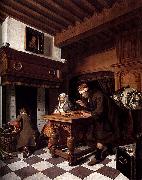 |
Cornelis de Man
|
|
(Delft, 1 July 1621 - Delft, 1 September 1706) was a Dutch Golden Age painter.
Kornelis was not satisfied with life in Delft. He wanted to travel beyond the port of Dordrecht and that is what he did, spending a year in Paris as soon as he came of age and had enough talent to pay his way with his painting skills. He was well-received, but set off in the Spring for Lyon in order to cross Lombardia and the mountains before another winter set in. He settled for two years in Florence, where he had a rich patron, but stayed the longest in Rome. On the way back home he stopped in Venice, and in the end was gone for a total of nine years |
|
|
|
|
|
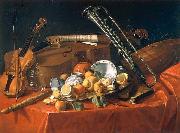 |
Cristoforo Munari
|
|
(July 21, 1667 - June 3, 1720) was an Italian painter of the late-Baroque specializing in still life paintings. He was also known as Cristofano Monari.
His initial training was in Reggio Emilia, his birthplace, and he came under the patronage of Rinaldo d'Este, Duke of Modena. In 1703-1706, he lived in Rome, then moved to Florence, where for about a decade he was attached to the court of the Medici. His still life paintings recall those of Evaristo Baschenis; however, the added disarray of porcelain, glass, and foodstuffs, suggest the hangover from the jovial surfeit of the Medici court. He painted also panoplies and war trophies. In 1715 he moved to Pisa where he worked almost exclusively in art restoration; he died in 1720.
An exhibition of his paintings took place in 1998 in Reggio Emilia, where it attracted wide attention and was a national success.
|
|
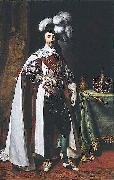 |
Daniel Mijtens
|
|
(Delft, c. 1590 - The Hague, 1647/48), known in England as Daniel Mytens the Elder, was a Dutch portrait painter who spent the central years of his career working in England.
He was born in Delft into a family of artists and trained in The Hague, possibly in the studio of Van Mierevelt. He was the nephew of the painter Aert Mijtens, the older brother of the painter Isaac Mijtens, and the father of the painter Daniel Mijtens the Younger. No known work survives from his first Dutch period.
By 1618, he had moved to London where his initial patron was the leading art collector Thomas Howard, 21st Earl of Arundel. Mijtens painted the Earl and his Countess, and was soon commissioned to paint King James I and his son Charles, Prince of Wales. In 1625 he became painter to Charles I.
After the prince's accession to the throne as Charles I in 1625 Mijtens produced such a large number of full length portraits of Charles I and his courtiers, including duplicates, that it is assumed that he had workshop assistance. Two of his finest portraits are of the same man, James Hamilton later 1st Duke of Hamilton, whom he painted as a seventeen year old in 1623 and again in 1629. Mijtens made visits to the Netherlands in 1626 and 1630, perhaps to study the latest developments in his field, more particularly the works of Rubens and Van Dyck.
Mijtens introduced a new naturalism into the English court portrait, but after the arrival in England of the far more distinguished Anthony Van Dyck in 1632 he was superseded as the leading court portraitist, and around 1634 he appears to have returned to the Netherlands permanently. He subsequently worked primarily as an art dealer in The Hague, acquiring works for the Earl of Arundel among others. Only four paintings survive from this final period.
Some of Mijtens' works are still owned by the Royal Family. Mitjens also made copies of old portraits of royal sitters including; James IV of Scotland, his wife Margaret Tudor, and Mary, Queen of Scots.
|
|
|
|
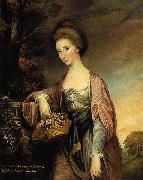 |
David Martin
|
|
painted Portrait of Elizabeth Rennie, Viscountess Melville in 1750-1847
|
|
|
|
|
|
|
|
|
|
|
|
|
|
|
|
|
|
|
|
|
|
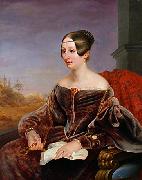 |
Eduard Magnus
|
|
(January 7, 1799 - August 8, 1872) was a German painter.
Magnus was born in Berlin, and studied simultaneously at the Berlin Academy of Art, Bauakademie, and University of Berlin. He later traveled to Paris and Italy, returning to Germany in 1829. He went to Italy again in 1831, and traveled through Paris and England before returning again in 1835. In 1837 he became a member of the Academy of Art, and in 1844 a professor. From 1850 to 1853 he traveled to France and Spain. He died in 1872 in Berlin. He was for a time the preeminent portrait painter in Berlin.
Eduard Magnus was the elder brother of the physicist and chemist Heinrich Gustav Magnus.
|
|
|
|
|
|
|
|
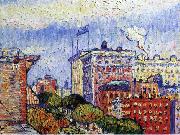 |
Edward Middleton Manigault
|
|
(June 14, 1887 - August 31, 1922) was an American Modernist painter.
Manigault was born in London, Ontario on June 14, 1887. His parents were Americans originally from South Carolina.Encouraged in art from an early age, he was commissioned at the age of 18 the city of London to make renderings of public buildings for reproduction as postcards. |
|
|
|
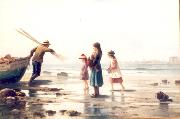 |
Edward Moran
|
|
(August 19, 1829 in Bolton, Lancashire, England -June 8, 1901 in New York City) was an American artist.
He emigrated with his family to America at the age of 15, and subsequently settled in Philadelphia, where after having followed his fathers trade of weaver, he became a pupil of James Hamilton and Paul Weber. In 1862 he became a pupil of the Royal Academy in London; he established a studio in New York in 1872, and for many years after 1877 lived in Paris. He was a painter of marine subjects and examples of his work such as Devile Crag; Island of Grand Manan are in many prominent collections. Among his canvases are 13 historical paintings, intended to illustrate the marine history of America from the time of Leif Ericsson to the return of Admiral Dewey's fleet from the Philippines in 1899.
His sons Edward Percy Moran (born 1862) and Leon Moran (born 1864), and his brothers Peter Moran (born 1842) and Thomas Moran. |
|
|
|
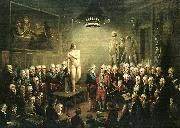 |
elias martin, gustav
|
|
Elias Martin, döpt 8 mars 1739 i Stockholm, död 25 januari 1818, svensk målare som vann internationell berömmelse under sin livstid för sina landskapsmålningar, porträtt och genremålningar, och var "associate member" av Royal Academy.
Elias Martin var son till åldermannen i snickarämbetet Olof Martin och Ulrika Haupt, syster till Georg Haupt. Han fick sin första utbildning hos fadern och visade sådan talang att han sändes till ämbetsmålaren F.C. Schultz. Genom denne fick han anställning hos Fredrik Henrik af Chapman som arkitekturritare och teckningslärare för officerarna i Sveaborg. Där fick han ledning av fältmarskalken Augustin Ehrensvärd, och umgick med och undervisade dennes son Carl August Ehrensvärd. |
|
|
|
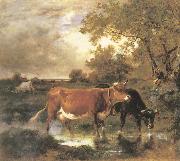 |
Emile Van Marcke de Lummen
|
|
1827-1890
Emile van Marcke was born in S??vres - into a family of artists. His father was Jean-Baptiste (1797-1848), the eldest son of Charles van Marcke and a painter who specialized not only in landscape and animal paintings, but also works on porcelain. |
|
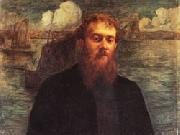 |
emile-Rene Menard
|
|
(1861 - 1930) was a French painter born in Paris. From early childhood he was immersed in an artistic environment: Corot, Millet and the Barbizon painters frequented his family home, familiarizing him thus with both landscape and antique subjects.
Menard studied at the Academy Jullian from 1880 after having been a student of Baudry, Bouguereau, and Henri Lehmann. He participated in the Salon of the Secession in Munich, and the Salon de la Libre Esthetique in Brussels during 1897. Several personal exhibitions were also devoted to him at the Georges Small Gallery. In 1921 he exhibited in the Twelfth Salon along with Henri Martin and Edmond Aman-Jean. Galleries in Buffalo, New York and Boston, Massachusetts exposed Menard and his art to the United States. However, the numerous commissions that Menard received from the French government crowned his career; for example, the cycle for the Hautes Etudes e la Sorbonne, the Faculte de Droit, and the fresco Atoms for the Chemistry institute, and finally the Caise des Depôts in Marseilles.
Menard's art allies a rigorous, clear classicism with a diffuse and dreamlike brushwork. In 1894, Victor Shoe wrote of Menard in l' Art et la Vie (Art and Life): "visions of a pacified, bathed nature, of dawn and of twilight, where the soul seems to immerse itself in the innocence of daybreak, and breathe the divine anointment that comes with the dawn."
|
|
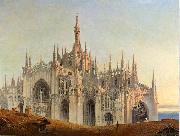 |
Emilio Magistretti
|
|
(Milan, 1851 - 1936) was an Italian painter.
Magistretti studied at the Brera Academy of Fine Arts from 1871 to 1875 under the guidance of Francesco Hayez and then accompanied him on his Italian journey of 1879. He worked initially in a range of different areas, from genre scenes to religious subjects and perspective painting, and successfully tried his hand at painting portraits, animals and landscapes at the turn of the century. He began to establish his reputation as an artist in 1880, when he was awarded a prize by the Ministry of Education, and became well known as a painter of moderately naturalistic portraits particularly appreciated by the middle-class establishment. An autobiography richly illustrated with reproductions of his most celebrated works was published in 1926.
|
|
|
|
|








